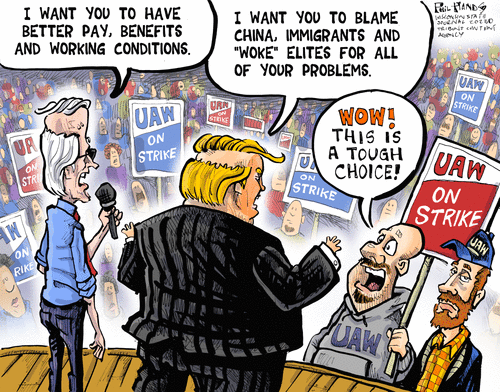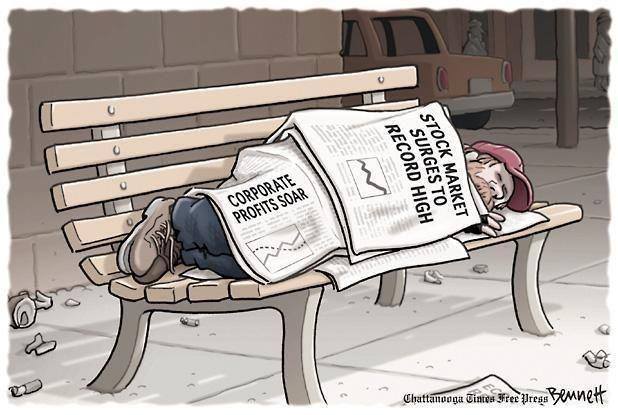Political Economy category archive
Misdirection Play, SOL* Dept. 0
James Rosen reviews the myth behind the misdirection and what the misdirection is meant to misdirect us from. A few tiny excerpts (emphasis added):
(snip)
The notion that more rigorous standards, whether imposed by states or the federal government, can significantly improve public education prevents us from confronting a harsh truth: Teachers, tasked with one of the most demanding and crucial jobs, don’t get paid enough.
(snip)
My experience has shown me that one great teacher is more important than any academic standards that produce only rote and superficial learning.
__________________
In my home state, “SOL” is alleged to stand for “Standards of Learning.”
Marie Antoinette Redux 0
The Arizona Republic’s E. J. Montini paraphrases Arizona Representative Andy Biggs’s stance on the impending shutdown of the federal government:
The (Corporate) Welfare State 0
At AL.com, John Archibald runs the numbers and concludes that Alabama is happy to pay welfare to rich corporations, but not to poor individuals.
I suspect you can find similar numbers for other states.
Afterthought:
Archibald doesn’t address this in his column, but it occurs to me that persons who can’t afford, say, for example, day care for their children and therefore have trouble finding jobs likely also cannot afford campaign contributions.
Enjoying Your Weekend? 0
Well, Robert Reich wants you to know why you have one to enjoy.
All That Was Old Is New Again 0
Der Spiegel has a fascinating interview with MIT economics professor Daron Acemoglu on the effects of advances in technology on society, with a focus on AI. As he looks at the effects of technological changes in history, Acemoglu sees parallels. Here’s a tiny little bit from the article.
DER SPIEGEL: But it is true that humankind has indeed benefited a lot from new technologies.
Acemoglu: That is the reason we have to go so far back in history. The argument that you just gave is wrong. In the past, we’ve always had struggles over the uses of innovation and who benefits from them. Very often, control was in the hands of a narrow elite. Innovation often did not benefit the broad swaths of the population.
DER SPIEGEL: Has the standard of living not risen steadily?
Acemoglu: Today, we are so much more prosperous than the people in earlier ages, that’s true. But there is a tendency to think that the path between must have been a straightforward and inevitable process. We all tend to gloss over the difficulties on the way.
DER SPIEGEL: What do you mean exactly?
Acemoglu: Take medieval windmills, a very transformative technology. It changed the organization of textile manufacturing, but especially agriculture. But you didn’t see much improvement in the conditions of the peasants. The windmills were controlled by landowners and churches. This narrow elite collected the gains. They decided who could use the windmills. They killed off competition.
I commend the complete interview to your attention.
Aside:
You can see this playing out in the current AWG SAG-AFTRA stike.
The Unforgiven 0
At the Portland Press-Herald, Victoria Hugo-Vidal unloads about the fuss over President Biden’s attempts to lift the yoke of student loans from the necks of college students.
I commend her article to your attention.
Aside:
When I went to college, tuition was still within the reach of middle class families. My parents could afford my tuition and I did not need student loans. But that was before Ronald Reagan became president.
Reagon’s toxic trickle-on economics has gutted the middle class, eroded working class incomes, and imposed a crushing burden of debt on college students.
Credit Crunch 0
Thom explores why Republicans are willing to erode America’s credit rating.
Aside:
The Founders were leery of political parties–they used the term “faction”–because they feared the time would come when a faction would put itself above the nation.
Methinks said fears may not have been unfounded.
The Disconnect 0
The Star-Ledger’s Tom Moran looks at a recent Monmouth poll showing that over half of the populace thinks that the economy is doing poorly, then he runs the numbers, which indicate quite the opposite. A snippet:
Here are some inconvenient facts for Biden’s critics:
Since he took office, the economy has added 13 million new jobs, the most ever created in a single term. The unemployment rate is 3.6 percent, the lowest it’s been since the 1960s. The rate among Hispanics hit a record low of 3.2 last year, and for Blacks, the all-time low came this spring, when the rate dipped to 4.7 percent.
The man deserves a thumbs-up. But the Monmouth poll shows that 48 percent disapprove of Biden’s performance on jobs, with 47 percent approving.
Follow the link for his thoughts on the disconnect.
Both Sides Don’t 0
F. T. Rea points out that one thing is not like the other thing. Here’s a tiny bit from his article:
Republicans like their labor cheap and hungry. So high un. employment is usually preferable. That was bullshit campaign promises to create new jobs have more traction, too. For Republicans, tax breaks for billionaires are more important than infrastructure maintenance and improvements.
Stray Question 0
Instead of bulldozing homeless encampments, why not do something to house the homeless?
On second thought, that might promote the general welfare.
Why, that must most certainly be unconstitutional.
Extortion Contortions 0
At the Hartford Courant, Democratic Congressman John Larson argues forcefully that the debt ceiling as it currently exists is a failed policy. He states (emphasis added)
Follow the link for his reasoning.
Punishing the Poor for Being 0
One of the features of the pending debt-ceiling compromise bill is increasing work requirements for persons receiving SNAP and TANF benefits.
Cara Brumfield explains why this is a con and a scam. A snippet:
The reality is that millions of workers rely on programs like Medicaid and SNAP because they are paid low wages, have unpredictable schedules, and lack benefits — all of which make it harder to meet the work requirements.













